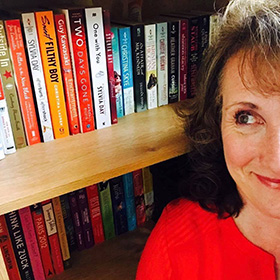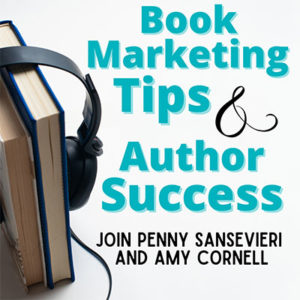One of the biggest book marketing blunders is this: not knowing who your reader is. We’ve talked about this before, with our reader profile (download my free reader profile brainstorm worksheet here), but this goes actually deeper than that. Because you may “think” you have the right reader, and you’re targeting them accordingly. But as is often the case, when an author comes to me saying “I’m doing everything right, but my book isn’t selling!” one of the culprits of this lack of sales could be the genre. Let me give you an example.
Some years back, we got a call from a traditional publisher who had a book that they’d been pushing into the true crime market, and heavily. The book had gotten some acclaim there, but not nearly enough. The publisher had bigger expectations for the book and, rightfully so. The book was about a son, who had attempted to murder his entire family. He’d killed everyone but his father – who, through the process of his own faith, found a way to forgive his son. While the true crime people loved it, I thought that perhaps the Christian market would love it even more. I was right. The Christian market resonated with its message in a way that true crime never did and the book took off. We got the book a year after it was released and the publisher was ready to give up. The Christian market breathed new life into this book and it ended up doing extremely well.
In another instance we had an author who had published a romance which she had dubbed: a paranormal, time travel, royal romance. The protagonist was psychic (paranormal) and her spirit could travel through time, whereas unlike say in Outlander, Claire was actually gone. This character wasn’t. So it wasn’t time travel per se, and it also got some push back from the paranormal community because the author hadn’t vetted it well enough to know that the paranormal community is pretty hard-core paranormal, meaning that the book should be paranormal heavy to succeed there. The novel was actually 80% contemporary romance and only 20% paranormal, which was an unfortunate metric to reach this market so it never fully did.
How do these things happen? Well, sometimes it’s the author’s fault (which I’ll explain in a minute), and other times it’s just an odd turn of the market. For the first book, had I been involved in the marketing plans from the beginning, I probably would have dubbed this true crime as well. It was only after its semi-lukewarm welcome to that market, did we realize that the book marketing efforts to this biggerer, more robust area had been completely overlooked.
If you feel any piece of this resonates with you, let’s have a look at what you can do to save your book and get your book marketing back on track.
Be an Avid, Crazed Fan of Your Genre to Sell More Books
I’m always a little skeptical (ok, a lot skeptical) when an author says that the genre they are writing for isn’t one they’re particularly a fan of. I’m even more skeptical when they say they don’t read in that genre. Regardless of where you are at with your book marketing, this is quite possibly one of the worst mistakes you can make. Reading in your genre will not only help your work, but it’s a must if you want to succeed in writing a book that appeals to this particular reader.
In my view, readers don’t get enough respect. We write the books we want to read. And, according to the famous quote from Stephen King it’s what you need to do to be a great writer. But I would bet on his next bestseller that he’s also a big fan of his own genre.
Readers have particular needs, and if your book doesn’t fulfill them, they won’t finish reading. This is why 1 in 2 readers won’t finish your book. You don’t keep their attention, they don’t continue reading, they move on to someone who respects what they want in a book. Now, you may say: “But at least I made the sale!” And this is true. But you won’t sell more books in the future, you won’t build your fan base, and you won’t get reader word-of-mouth which is how 95% of books are sold (Digital Book World, 2016). And, to be candid, it’s just bad book marketing.
Knowing what your reader wants, down to the tiniest detail, is key to selling more books and running a successful book marketing campaign. If you’re not sure if your book hits the market, buy a few bestselling books in your market. Read them and do your best to evaluate your book with a critical eye. If you feel you’re too close to it, and many of us are, then hire someone to help you do this. Often a good content editor who specializes in a particular genre can help you do this, too. He or she can advise you whether a book is really paranormal, or whether you’ve hit the mark in your steam punk genre. Or, if you’ve written a non-fiction book, ask yourself if it meanders too long in the weeds without getting to the point. (You can read more here on how becoming a fan helps you sell more books.)
If you’re going to go the editor route, have a very candid conversation with any potential editors to make sure this is something they can offer you. Many can’t, some can. Find the right one for you, or as for a referral. And, as I mentioned before, they should be very familiar with your genre. This helps with things like nuances, settings, and description, which an avid reader will pick up on. And ultimately, this is just good book marketing that will help you sell more books.
Finally, make sure whoever you hire to help you with this process isn’t someone you know. People who know you, are your neighbors or whatever aren’t keen on being critical. Not because they don’t want to help out, but because they probably don’t want to hurt your feelings. As I’ve often said: if at some point your editor doesn’t make you cry or want to throw things, he or she probably isn’t doing a good job for you.
Read Your Own Book Reviews
Some people may tell you to stop reading your book reviews, especially the bad ones. Because you’ll wind up spending the day rocking in a corner. But if you can objectively step back from it, and learn, instead of spending your time mentally arguing with the book reviewer, I think you’ll learn a lot.
As you’re doing this, look for things that come up frequently in your book reviews. For example, on that royal romance I mentioned earlier several reviews said that it “wasn’t enough paranormal for them” and yet a few more said that they wished they’d known there was so much contemporary romance, they would have picked the book up sooner. This is what started the author down the path and made her realize that she had probably chosen the wrong genre for her book, and subsequently, her book marketing.
Other nuances in book reviews like: “I wish there was more of this or that” can also to help you unearth potential gaps in your story focus. In one instance, the same royal romance author saw mentioned, several times, that a friend of the person reviewing would love this, because it was super paranormal light. This again nudged her towards the idea that her book marketing needed a refresh.
Taking a read of your book reviews, and trying to do so objectively, is a great way to glean what reader needs haven’t been met. Though, that said, if you have lots and lots of reviews on your book and only one says “I wish this book had more werewolves” when it’s not even that kind of a book – is probably a unicorn or someone who bought the book without really reading the description, or who maybe thought they were reviewing a different book or whatever. You’ll always get some random book reviews that make you go: “Huh?” I would ignore these. The book reviews you’re really looking for feedback from are the ones that offer similar mentions of the same issues, again and again.
Will Changing My Genre Solve All My Book Marketing Problems?
The short answer is: maybe. The longer answer is: it depends. Changing genres isn’t hard. And thanks to all things indie publishing it’s pretty easy to go back and correct this fatal error if you find you’ve plugged your book into the wrong genre. (See this article on Amazon categories to learn more.) The problem is that if you have done this, you may be looking at other issues like covers and writing, which we’ll look at next. But I’ve seen some cases where both of these are lined up correctly (like the true crime book I mentioned earlier), but it’s the genre that’s wrong.
In some cases, if you can’t touch the genre – or don’t have access to change it on Amazon or anywhere else, this may be a situation of a necessary repitch to a wholly new and different market. We encountered this recently with a book we worked with that was dark, dark humor which we pitched to humor. They were keen, but not as keen as we would have liked them to be. The funny thing (pun intended) was that where we got the most book marketing love was with the murder group, not mystery per se but folks who were fans of those virtual games like Hunt a Killer, which has spawned not just the network of people who subscribe to their monthly “solve a crime” membership, but groups and blogs as well.
They key here is that you have to be willing to step back from your original intent and be willing to look at the big picture. It’s this kind of willingness to be flexible in your book marketing, that can bring you success.
Don’t Sell a Puppy to a Cat Person
It’s hard, if not impossible, to get readers to jump genres. If you read a ton of new age, let’s say, you’re probably not inclined to read a business book. Not because you aren’t business-minded, but instead, it’s just not your thing. The same is true for genre readers. Romantic suspense readers may cross over into contemporary romance, but we know that contemporary romance won’t cross over into suspense, or rarely. So you must take this into consideration in your book marketing.
As we’re writing our books, we often let the creative muse take us on our journey and, in so doing, we sometimes forget what the reader needs and expects. One of the statements that I’ve come to deem as the laziest thing any author can say is: “Well, I’m sure they’ll buy it anyway.” Because guess what, they won’t. What this statement tells me is that you sort of did your homework, but sort of didn’t. Or, like when you were a kid and your mom asked you to clean your room and you shoved all your junk under your bed. Eventually your mom found out, and your readers will, too.
Be true to your market, respect your reader, give them what they want – even if it means giving up your dream of writing a mystery book based on a unicorn that has disappeared. If you want to write that unicorn book, go or it, but don’t expect to sell any to a straight up mystery reader market.
Cover Your Reader’s Expectations
While we’re talking about readers and what they want, the cover is another big area where authors often lose a reader. You may have a great book that your business reader market will love, or romance or western or whatever genre you’re writing to, but if your cover doesn’t match the genre you’re going after, your book sales and book reviews will tell you.
We get authors all the time who come to us with book covers that they “love!!” but that aren’t right for their market. Or they use someone’s painting or drawing, or have a friend design it. Or, maybe you just didn’t have the money to spend on a great cover. Well, I can tell you that this isn’t an excuse anymore — not like it used to be anyway. Lots of really great cover designers have cropped up that can do a cover for you for under $1000, some under $500. I had my last cover designed for $275. Covers are significantly important. If you need a designer to help you with branding, you probably don’t find that kind of help for under $1000. But if your brand is solid, if you know what kind of “look” your readers are expecting, then you can probably spend a bit less on this.
If you aren’t sure what your book market wants, in terms of the look of the cover, then you should probably work with a pricier cover designer to get it right. The less you pay for a cover person, the more research you’ll need to do in your genre in terms of covers, colors, looks, etc. If you aren’t prepared to do that, then prepare to shell out some money to have someone help you. Believe me when I say: to hit the mark on the exact right cover is worth every penny. Readers judge a book by its cover, and to think they don’t, or they’ll “buy your book anyway” is a book marketing mistake that will cost you your career, and probably book sales, and any hope of building a fan base. In fact, this is one of the reasons you may wish to revise and re-release your book. Read more here about how this technique can help you sell more books.
What If You Chose the Wrong Genre or Book Cover or…?
When I was a kid, we were always allowed to call a “do over,” which meant that you hadn’t gotten it quite right. Whether it was missing the mark at hop scotch, or not being quite ready for the tree climbing contest. You could call a do-over and, if you didn’t abuse this privilege, you could start fresh, like nothing ever happened.
The same is true for book publishing and book marketing.
If you have a book that’s not quite right for the genre, and have had numerous readers, and maybe a solid content editing person tell you so, then it’s time to consider what you’ll do. If the cover is wrong, that’s an easier fix, but either way you now have a choice. You can move onto the next book and hope you get it right, or call a do-over and go back and do it right the first (or second) time.
My personal preference is to go back and do it right. You, your book, and the efforts you invest in book marketing deserve this. And this goes for those of you who have (several) books and your ah-ha moment hits you on your 4th book: “Now I get why my first book failed!” It’s ok to redo the first one, even if it’s been out for a while. Because now with a re-release, you can potentially revive your entire library of books.
I’ve written a lot about re-releasing and reviving a book, so I won’t get into it too much here. Instead I’ll link to some other pieces I’ve done on this in the body of this article so you can peruse them at your leisure, if you decide this is the route you want to go. I also published a book on this earlier this year, if you’d like detailed information on why and how to do this. (Here’s the Amazon link.)
The point is that where this is a will, there is hope. If you’ve written a terrible book, and the book reviews reflect this, you’ll know that and you can decide if this writing thing is really right for you, or if there’s something else you were meant to be doing.
But for those of you (and you know who you are) who have solid books out there that were send down the wrong reader highway either via cover or genre, then maybe it’s time to consider your do-over and it can mean for you and your long term book marketing. Before you throw your hands up and say “this is too hard, this publishing thing is too competitive!” take another, closer look at your book. Sitting with your arms crossed, stomping your feet saying: “My book is perfect, I don’t understand why everyone doesn’t love my book!” won’t make you a success, and it won’t sell more books. No one’s book is ever perfect, there’s always room for some kind of improvement if you’re willing to see through your own starry-eyed goals.
Objectivity, when it comes to book marketing and book publishing, is one of the best gifts you can give to not only yourself, but also your reader.





0 Comments
Trackbacks/Pingbacks